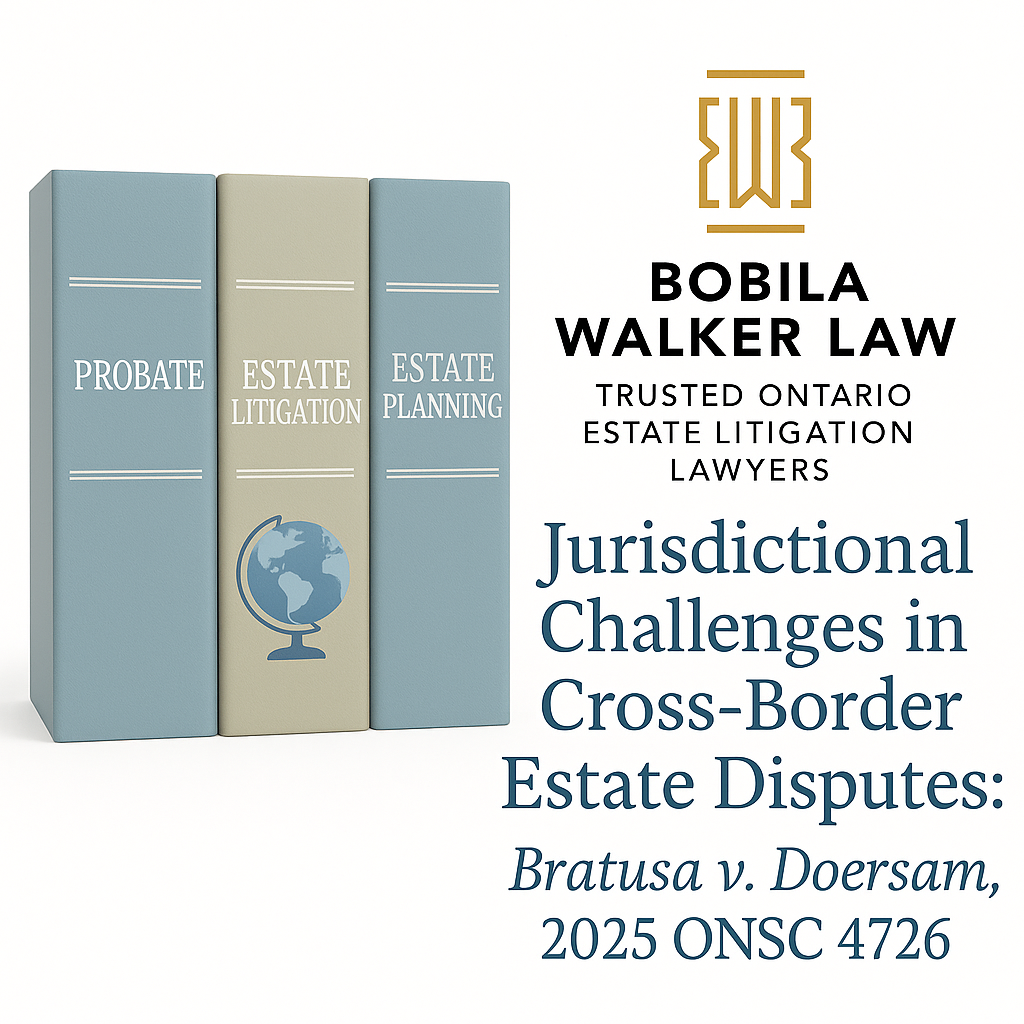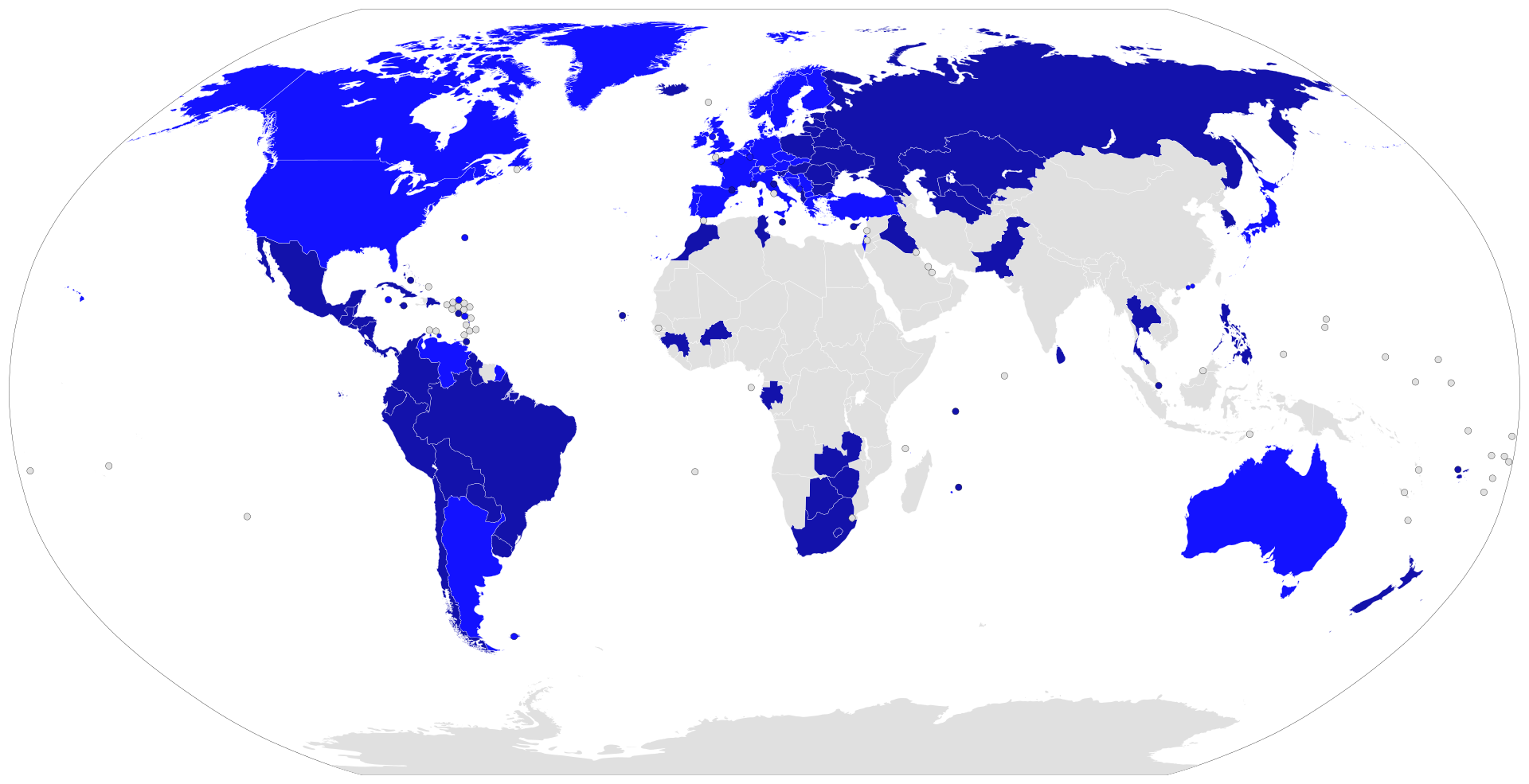Overview
In Bratusa v. Doersam, applicants Nicole Lynn Bratusa and her minor daughter, Olivia Jade Doersam Bratusa, sought dependent’s support from the estate of Ryan Campbell Doersam, who died in Costa Rica in September 2024. The applicants, who lived with the deceased in Costa Rica, aimed to access the estate’s assets and the value of over $4 million in life insurance proceeds held in trust for the deceased’s four children from a prior marriage. The respondent, Kendra Lauren Dawson, the deceased’s estranged wife and estate trustee, moved to stay the proceedings, arguing that the Ontario Superior Court lacked jurisdiction or, alternatively, that Costa Rica was the more appropriate forum. Justice F.L. Myers held that Ontario lacked jurisdiction and permanently stayed the application, emphasizing the significance of the deceased’s domicile in determining jurisdiction.
The Facts
Ryan Doersam, originally from Ontario, relocated to Costa Rica with Kendra Dawson, his then-wife, between 2016 and 2017, selling their Toronto home in 2019. They separated but remained legally married until Ryan’s death. His 2007 Ontario will named Dawson as the estate trustee and sole beneficiary. Ryan designated his four children from his marriage to Dawson as beneficiaries of over $4 million in life insurance proceeds, held in trust by his father in British Columbia under Ontario law.
In Costa Rica, Ryan met Nicole Bratusa in 2020, cohabited with her from 2021, and had a daughter, Olivia, born in 2021. He died without updating his will to provide for them, though he had begun planning to do so. After his death, Nicole and Olivia moved to Ontario, alleging that Dawson, as estate trustee, had retained Ryan’s Costa Rican properties (valued over $10 million) to the estate’s detriment. The applicants sought to access the life insurance proceeds under SLRA sections 63 and 72, which permit courts to include non-estate assets in dependent’s support claims.
Nicole had previously filed family law claims for support in Costa Rica, which were dismissed as improperly framed. Expert evidence confirmed that Costa Rican law allows Olivia, but not Nicole, to claim dependent’s support from the estate, but it does not permit access to life insurance proceeds. A prior Ontario family law proceeding by Dawson against Ryan was dismissed for lack of jurisdiction, with Justice Kristjansen finding that Ryan was permanently domiciled in Costa Rica—a finding relied upon in this case.
The Law
The case engages principles of private international law, particularly jurisdiction and choice of law in estate matters:
- Jurisdiction Simpliciter: The Supreme Court of Canada in Club Resorts Ltd. v. Van Breda (2012 SCC 17) and Sinclair v. Venezia Turismo (2025 SCC 27) established that jurisdiction requires a “real and substantial connection” to the forum, assessed through presumptive connecting factors such as the defendant’s domicile or the location of a contract. Defendants may rebut these factors by demonstrating that the connection is weak, undermining order and fairness.
- Choice of Law: The law of the deceased’s domicile at death governs the administration of movable property, including dependent’s support claims (McCallum v. Ryan Estate, 2002 CarswellOnt 1211). Domicile is determined by residence and intent to remain indefinitely.
- SLRA Provisions: Sections 58–74 of the SLRA allow courts to order support for dependents if the deceased failed to provide adequately. Sections 63 and 72 permit accessing non-estate assets, such as life insurance proceeds, for such claims. Costa Rican law, however, limits claims to estate assets and recognizes only legal spouses for dependent’s support.
- Forum Non Conveniens: If jurisdiction exists, a court may stay proceedings if another forum is clearly more appropriate, considering factors such as convenience, costs, witness availability, multiplicity of proceedings, and procedural advantages (Van Breda).
Analysis
Justice Myers concluded that Ontario lacked jurisdiction, as the respondents successfully rebutted the presumptive connecting factors. The applicants argued that Ontario-based assets (e.g., RRSPs, investments) and the life insurance trust under Ontario law established a real and substantial connection. However, the court found these connections insufficient.
The dispute’s core—whether Nicole and Olivia were entitled to support—arose from their relationships and dependency on Ryan in Costa Rica. Ryan’s domicile was clearly Costa Rica, as affirmed by his permanent residency, prior judicial findings, and sworn statements. The 2007 Ontario will was irrelevant, as the case did not involve its interpretation or validity. The life insurance trust, while governed by Ontario law, was a peripheral factor; it regulated asset holding, not the substantive issue of support entitlement.
The court noted a circularity: the insurance proceeds’ relevance as a connecting factor depended on applying the SLRA, but Costa Rican law, likely governing due to Ryan’s domicile, excluded such assets and barred Nicole’s claim. Even if Ontario had jurisdiction, the choice of law would be determined later, and the applicants’ Costa Rican proceedings reinforced that jurisdiction’s centrality. The court found no strong connection between the dispute and Ontario, as the applicants’ lives and claims were rooted in Costa Rica.
On forum non conveniens, the court made obiter findings that Ontario was not clearly less convenient than Costa Rica. Costs, witness availability (via videoconferencing), and procedural advantages were neutral, and multiplicity of proceedings posed minimal risk of conflicting outcomes. However, this analysis was moot given the jurisdictional ruling.
The court lifted an interim order preserving the insurance proceeds, effective September 19, 2025, absent an appeal.
Lessons Learned
The Bratusa v. Doersam decision offers several key takeaways for estate planning and litigation in cross-border contexts:
- Importance of Domicile: The deceased’s domicile at death is a critical determinant of the applicable law for estate administration and dependent’s support. Clear documentation of intent regarding domicile is essential, particularly for individuals relocating internationally.
- Timely Estate Updates: Failure to revise estate plans after significant life changes, such as new relationships or children, can leave dependents unprotected. Ryan’s incomplete plans highlight the need for prompt action, especially across jurisdictions with differing laws.
- Strategic Claim Framing: Claimants must carefully frame claims under the appropriate legal framework (e.g., estates law versus family law) and assess jurisdictional options. Nicole’s dismissed Costa Rican claims underscore the importance of precise legal strategy.
- Limits of Asset Location: The presence of assets in a jurisdiction does not automatically confer jurisdiction over foreign estate disputes. Courts prioritize the dispute’s substantive connections over the location of assets.
- Role of Expert Evidence: In cross-border disputes, expert opinions on foreign law are vital to clarify substantive differences and inform jurisdictional arguments.
For individuals with international ties, this case emphasizes the need for specialized legal advice to navigate jurisdictional and choice-of-law complexities. Engaging professionals versed in private international law can help avoid procedural and substantive pitfalls in estate disputes. Contact our estates litigation lawyers at 416-847-1859.






